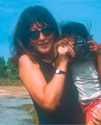Maybe it's because I heard that over a million Syrians have fled their country. Or maybe it's because I watch 'Who do you think you are?" the intriguing series about family heritage and ancestry. And the headlines for months in every British newspaper were hijacked by news over the latest wave of immigrants (replaced now by news of flooding). Maybe that's making me think about my British passport. And how I came to have one. And how this ties into my ongoing project on immigration and refugees.
Over the years I've met so many children who were born in one country – but live in another. To some, like Indira in Belize, immigration is a gift of multiplication. Double luck: an American mother. A Creole father. Two countries, two cultures, two languages. For other children, it's an act of subtraction and addition that cancel each other other: one country lost. One country gained. And for the those born - or spending their childhood - in a refugee camp, it's a lot of subtraction. I've seen them, in some kind of limbo, suspended between a country they barely - or never - knew, with dreams of a country that can almost appear more of a myth than a reality. Looking out at the world through a fence topped with barbed wire. And then the Internally Displaced Persons I met in Uganda. LIke so many displaced from their home/village by conflict, they lived in camps within their own country: neither refugees nor immigrants. Just displaced (update - many have returned to their villages since I visited the camps). And then there are economic refugees, or 'detainees'. Who are not, technically, recognised as refugees. It's complicated. It's important. Because many of us owe our lives to immigration.
I am the fifth generation in my family born with a different passport, so immigration is almost a personal story. My family - on both sides - has been displaced by war, persecution, economic necessity, the desire for a better life - for the last 5 generations. No - at least 7 generations. My family on my father's side is Ukrainian/Latvian who found their way to Russian, and then Vienna. My paternal grandfather, Sascha, left Vienna with his young wife for a job in Manchester, where my father was born - because his German-speaking father had been detained (hence, my British passport). A few years later, Sascha died in the flu epidemic - in Switzerland - and my father was sent to relatives in Austria. Where he lived until the next war. War. Epidemics. More war. Followed by, understandably, the desire for a Better Life. A similar story, albeit from Italy, and a generation earlier, was played out on my mother's side. After the war, my father emigrated to America. Where his Latvian mother had eventually settled. Where he met my Italian mother.
And I remember, riding the bus to school in America, a favorite game was 'where you from?" 'I'm Irish, Scottish and French', one would say proudly. 'I'm German and English', another would pipe up. 'I"m Russian and Italian', I would say, and for some reason this made me unaccountably proud. Maybe that explains this affinity, or empathy, I have towards immigrants, especially the children. The empathy I share with schoolchildren when I present the stories of immigants and refugees. Born in one place, but living somewhere else: out of choice, out of necessity, because they are following a dream. Because they lost a dream. Because they want to live a different life. Or because they just want to live.

